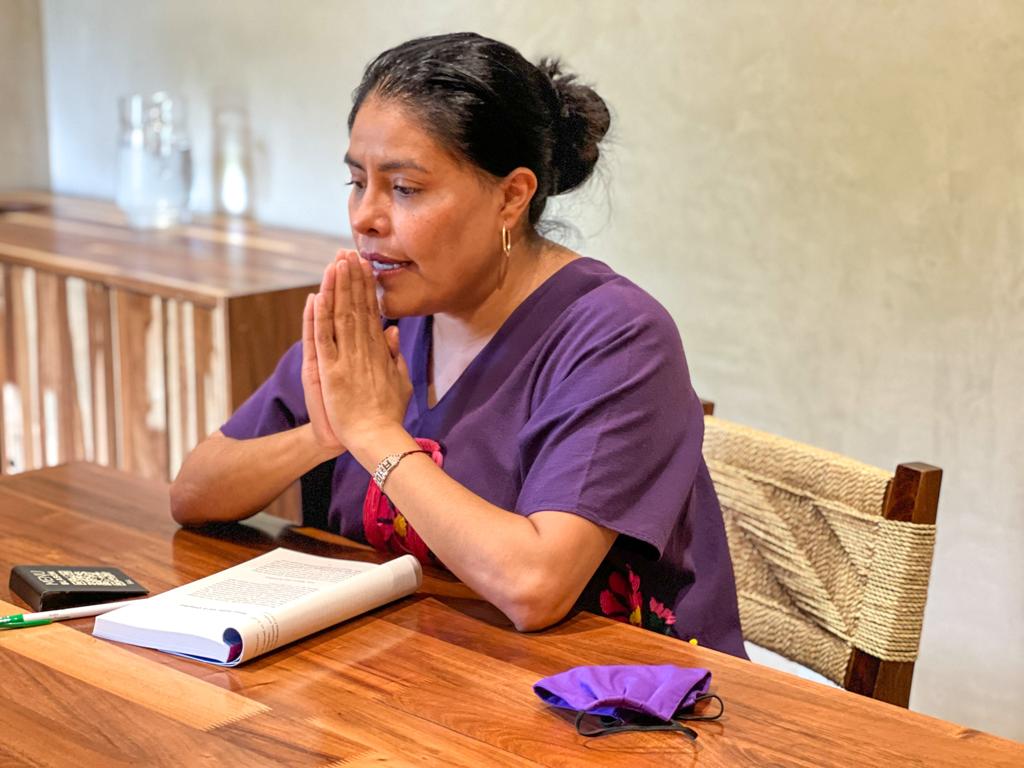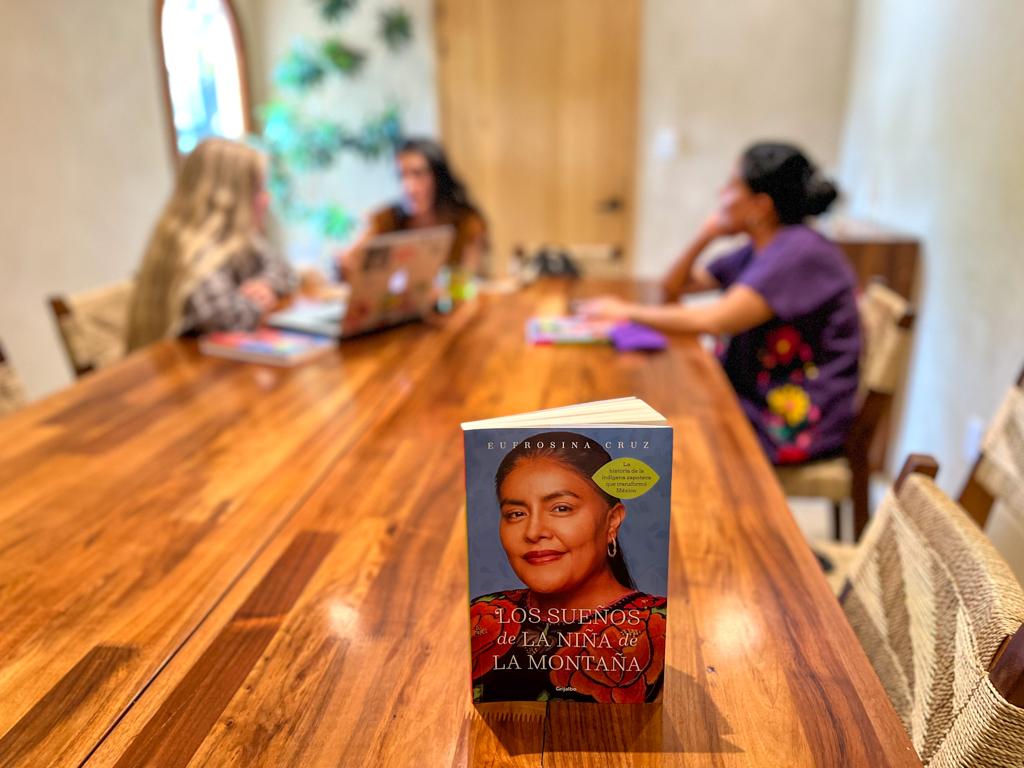Interview with Eufrosina Cruz, the activist that fights for Mexican women rights
By Frances Douglas-Thomson
Eufrosina Cruz is the first indigenous woman to enter politics in Mexico, born in Santa María Quiegolani, Oaxaca she left her neighborhood at the age of 12 to pursue educational opportunities. Once away from home, she realised that she didn’t deserve the life that was laid out in front of her and decided to change her trajectory and inspire other young females to do the same. I was fortunate enough to meet her to understand more about what inspires her, the challenges she has faced so far and the writing process behind her new best-selling book “Los sueños de la niña de la montaña – The Dreams of the Mountain Girl“.

We started the conversation discussing her early life and route into politics. Around 20 years ago women were invisible, there was a very strong custom of women being the first to wake up and the last to go to bed, fulfilling all the household duties and supporting the men in the family. ‘Usos y Costumbres’ dictated much of the lived experience in her indigenous community and enforced many negative routines that kept women uneducated and oppressed. She told me that most girls were married at 13/ 14 years old. Her sister was 12 years old when she was married, 13 when she became a mother and now, at the age of 31, she had 9 kids. All the women the same age as Eufrosina are grandmothers. She doesn’t blame her father or anyone else for following the practices of their community because that was all they knew.
When she was 7 years old, her schoolteacher would let her play, which was highly frowned upon by the community. In her hometown girls couldn’t play, they had to cook, serve, help brothers and fathers. This teacher allowed her to play marbles with the boys, this freedom, she said, changed her life. Although her father punished her for going out to play and arriving late to the house, sometimes hitting her, he showed the biggest love to her when he let her go to study away from the community. She says it was difficult for him to let her go when the whole community married their children, yet he sent her to a different environment when he hadn’t ever even traveled to another community himself.
When she was 12, she left her house to study Spanish where she learnt that she had the right to be in public space and to play. Eufrosina believes the key to politics is education. “One girl with education can change her own paradigms and change her future“. If she didn’t take the first step to change, leave her hometown, her whole life would be completely different.
“No one is going to change our history if we don’t do it ourselves, to break the destiny that had been decided for you, you must challenge your own paradigms“.
Eufrosina is an indigenous Zapotec woman. There are 68 different dialects within Mexico with 16 existing in the state of Oaxaca. Because of this, Oaxaca has one of the lowest education rates in Mexico and many don’t speak the Spanish language which made it hard for them to engage with national politics and change making processes.
In terms of the situation for young girls now, she tells me that there are still child marriages with dowries including beers, animals, and money, but they have decreased. Two months ago, as a federal deputy she made a law against child marriage which used to be forbidden but not penalised “If there is a law that is forbidden and not penalised it is an imperfect law“.
Eufrosina has a long line of achievements including changing Article 25 in 2010 to ensure women were practically involved in politics both through voting and running for positions of power in the same way as men. She argues that customs within small communities such as her own should relate to features of culture such as language, food and clothing, but should not warrant or support the abuse nor make rules pertaining to who accesses certain human rights. The changing of Article 25 was later adopted by the UN in 2014. The way her community interacts with politics has changed drastically. Now 70% of the console is women. She told me she feels more like an activist than she does a politician. But “in politics you can make the change that you can’t in activism, politicians need to know what the screaming is about. You have to be inside to change“. She told me she now can modify things that hurt or caused her pain. She learnt that she must be the change, if she doesn’t change what she didn’t like, nobody’s going to do it. “You also must take responsibility of what you change. The pain and setbacks are worth it because when you achieve your own consciousness, you achieve your own destiny. It feels very Chingon (courageous/ cool)”.
“Don’t be afraid to take the space that you deserve, what life didn’t give you, you have to take. To be seen you must be brave. You find a lot of people that only criticise you, but what are they doing as a person in their neighbourhood, in their family? In their own fights. It’s very comfortable only to complain about the things, but if you stay still, life stays still. The fashion can pass, the hunger can pass, but your dreams won’t pass. And they won’t come true if you don’t work“.
One of the greatest days for her was the day women got called to vote in her hometown. She said all the women in her village were excited, her mother included. They all got dressed up in their best clothes with ribbons in their hair. This was the first-time women were accepted in the public space, that they were seen and welcomed into the city hall. On this day Eufrosina realised all her work had been worth it, for them.
Eufrosina experienced first-hand the discrimination within Mexican politics. When there is a face that is different, the treatment is different. She felt that she took a space that didn’t belong to her and experienced painful times because of this.
“Mexico has to learn how to look at indigenous people again with new eyes, the Indigenous people are not vulnerable, they do not need decisions made for them about their destiny. There is not a lack of intelligence, there is a lack of opportunity”.

“Los sueños de la niña de la montaña” is currently a best-selling book on Amazon, it has an audiobook form and shortly will be translated into English. Eufrosina said during the writing process, she had to find someone, an editor, who would allow her to be herself and speak freely. It was important to her to be candid about her life and views. It took two years to finish the book. During the writing process she understood how to forgive; how to forgive herself, how to forgive the circumstances and her father. It was also, at times, a very painful process in remembering small aspects of her life that were particularly hard. For example, that sometimes she didn’t have anything to eat. Regardless, she feels compelled to write the book to inspire young girls who may have similar beginnings in life.
The last page of her book expresses her wishes and dreams for the future:
“I want, for example, to show Diego (her son) what women are worth.
For him to know that we all win when women are respected.
I want to show society every day the extraordinary achievements of women.
I want their work to be recognized every day.
I want schools to always have places for girls when they need it,
and that there are never forced marriages for which they do not want.
I want a Mexico that respects all the rights of girls.
Above all, to teach young girls that they are magnificent.
That girls know they must take what they want from life.
And that they all have the right to imagine, build and fulfill their dreams, just like this girl of the mountain“.


